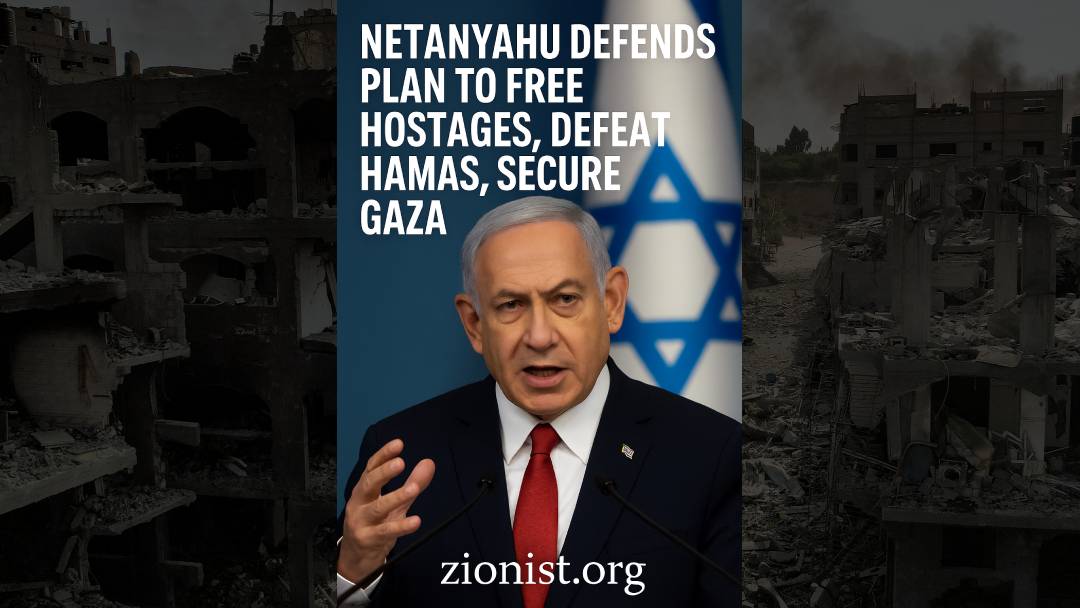Netanyahu outlines plan to free hostages, defeat Hamas, secure Gaza, and ensure lasting peace despite UN criticism and global backlash.
In a high-stakes press conference in Jerusalem, Israeli Prime Minister Benjamin Netanyahu laid out his government’s strategy to defeat Hamas, free the remaining hostages, and secure lasting peace for both Israel and Gaza.
Despite a chorus of criticism from the United Nations, several European governments, and segments of the international press, Netanyahu remained firm: taking control of Gaza City — Hamas’s last major stronghold — is the most direct and effective path to ending the war.
A Plan with Clear Objectives
Netanyahu outlined five guiding principles for concluding the war:
- Hamas disarmed.
- All hostages freed — living and deceased.
- Gaza demilitarized.
- Israel maintains overriding security control to prevent future attacks.
- A peaceful civilian administration in Gaza — neither Hamas nor the Palestinian Authority — that does not promote terror or incite violence against Israel.
He emphasized that Israel has no intention of permanent occupation or annexation, but will not allow a terrorist regime to rearm and repeat atrocities like those of October 7, 2023, when Hamas slaughtered 1,200 Israelis and took 251 hostages.
Freeing the Hostages: No Partial Deals
Of the original hostages, 205 have been recovered, 148 of them alive. Twenty living hostages remain in Hamas captivity, along with the remains of 30 others. Netanyahu rejected the idea of partial deals, saying Hamas has a record of deception — returning “a little here, a little there” while holding most victims indefinitely.
“We want them all,” he said. “A decisive victory is the way to achieve that.”
Countering the “Starvation” Narrative
Netanyahu forcefully denied allegations that Israel is starving Gaza’s population, calling the accusations “fake” and historically reminiscent of medieval blood libels against Jews. He noted that nearly two million tons of aid have been allowed into Gaza since the war began, but much of it has been seized by Hamas for its own use or to control the population.
The Prime Minister unveiled a three-step humanitarian plan to bypass Hamas obstruction:
- Safe corridors for aid distribution.
- More aid distribution points run by the Gazan Humanitarian Foundation.
- Increased airdrops by the Israeli Air Force and allied nations.
He accused Hamas of deliberately creating shortages to inflame global opinion against Israel — and highlighted that the only people being deliberately starved are Israeli hostages.
Support from the United States
While some European allies such as Germany, France, and the UK have criticized the plan — with some even halting certain military exports or floating recognition of a Palestinian state — the United States has remained steadfast. U.S. Ambassador Dorothy Shea told the UN Security Council that the war “could end today if Hamas let the hostages go” and dismissed accusations of genocide as “demonstrably false.”
Former President Donald Trump spoke with Netanyahu on Sunday, reaffirming his support and acknowledging Israel’s right to pursue Hamas until it is fully defeated. “That’s pretty much up to Israel,” Trump said, signaling tacit endorsement of the takeover plan.
Bipartisan Support from U.S. Lawmakers
Following a visit to Israel, Representatives Rick Crawford (R-AR) and Josh Gottheimer (D-NJ) voiced support for Netanyahu’s plan — so long as Israeli control is temporary and followed by a transition to a stable, non-Hamas administration, potentially involving a multinational Arab peacekeeping force. Both lawmakers agreed that the IDF’s action offers the hostages a better chance of survival than leaving them under Hamas’s brutal captivity.
The Strategic Imperative
Netanyahu views the capture of Gaza City as the tipping point for Hamas’s collapse. “The minute you collapse the center of gravity, the last true fortress left to Hamas in Gaza, Hamas falls apart,” he said.
For Israel, the operation is not about punishment or revenge, but about ensuring that Gaza can never again be used as a base for genocidal terrorism. As Netanyahu told reporters:
“Our goal is not to occupy Gaza. Our goal is to free Gaza — free it from Hamas terrorists, and create a future where Israelis and Gazans can live without fear.”



